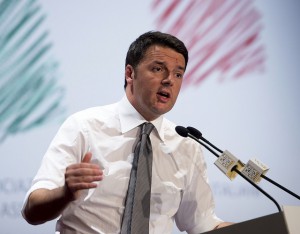
In a new series on Spotlight Europe three young Europeans depict the employment situation in their home countries. You´ll find the intro here or go to First part.
Italy is the third largest economy in the Eurozone, but unfortunately it has a history of underperforming. The total growth of the economy since the euro was introduced and 10 years before that is approximately none.
Regarding one of the most urgent issues in the country, unemployment, it is fundamental to underline how the economic crisis and the austerity policies have heightened existing national problems. The situation is critical especially for the youngest generations.
The unemployment rate among the 18-24 year olds reached 42 % in 2014, compared to the national rate of 12,6 %; the younger generations are victims of an eradicated system that characterizes their country.
The generation conflict
Italy has always suffered under a hierarchical system, with the young deferring to authority until it’s their time to take control. The Italian ruling class is Europe’s oldest: the average bank chief executive is 69 years old; court presidents 65; and university professors are on average 63.
“You are not considered experienced based on your CV, on your ability or according to your skills, but just based on your age,” says Federico Soldani, 37, an epidemiologist who left Pisa in 2000 and now works in Washington, D.C., for the Food and Drug Administration. “When you are under 40, you are considered young.” This typical Italian system has worked until the crisis hit and the economy froze in the last years.
A country of emigrants
These socio-economic and political disparities between generations lead to negative consequences, leaving emigration as the only option for many young Italians. As a result, Italy will have to face a major brain drain, which will negatively influence innovation, entrepreneurship, and investment, all of which are key drivers of economic growth.

It is interesting to observe how history repeats itself, Italy is a nation of emigrants like 100 years ago, but this time it is mostly young students and unemployed graduates that leave their country in search of possibilities. Italy is losing its potential saviors.
In 2013 almost 100,000 Italians left their country, the top destination was England, followed by Germany, Switzerland, France and also Australia. A growth of emigrants of 71.5 % in only one year highlights the country’s failure in tackling unemployment.
The major causes behind the big emigration flow are: low salaries, indifference of politicians to the problems, unrewarding educational process, gerontocracy, lack of jobs, lack of trust in politics, welfare system.
It is time to act
What are the next steps? Will the Italian Prime Minister Matteo Renzi be able to tackle unemployment and, most importantly, efficiently reform the labor market?
There are some lessons to be learnt from the crisis. Renzi made some broad proposals to extend jobless benefits, cut the number of short-term contracts, boost the role of employment agencies and reduce job protection for permanent workers.
The solution lies in a reform of the entrance in the labor market by modifying different factors.

First, internships and apprenticeships, which in Italy are underused and mostly misused, creating an “official black market”, should be developed and regulated. They could help improve the preparation and education of students, giving them the practical knowledge they are lacking, due to a mainly theoretical approach of the education system. Internships and apprenticeships are essential to build a necessary bridge between the education system and labor market. It is important to stop abuses and assure that internships have a formative content, in order to avoid them from becoming underpaid working contracts. Another aspect of the problem is the never ending paperwork, to hire an apprendista or trainee, the employer has to apply to 12 separate offices.
Secondly, a reform of the contracts and the Italian legal framework is necessary. Currently there are more than 40 different types of temporary and permanent contracts in Italy. The Biagi law (L 30/2003) has created a labor market based on temporary and short-term contracts. Temporary contracts are often cheaper than permanent ones, lower taxes, lower social security, less bureaucracy. To solve the hiatus between temporary and permanent contracts, it would be helpful to make the tax costs equal for both and allow incentives for permanent contracts in order to reverse the current situation.
The major debate has been on the article 18 of the workers’ Statute, which protects workers from unfair dismissal. While some believe this article is fundamental to protect workers, others, included Renzi, believe it is an obstacle to flexibility in the labor market and it decreases entrepreneurs’ freedom in hiring and firing employees.
The solution isn’t that simple, the labor reform or Jobs act should be strictly connected to the unemployment insurance system reform. The insurance system should involve all workers and not only a small part of them, the job search assistance should be strengthened and re-skilling should be an important part of job searching, giving unemployed people benefits isn’t going to solve their problems.
In other terms, flexibility without security is just going to worsen the situation.
In an open letter to his son published in November 2013, Pier Luigi Celli, director general of Rome’s LUISS University, one of Italy’s distinguished universities, wrote, “This country, your country, is no longer a place where it’s possible to stay with pride… That’s why, with my heart suffering more than ever, my advice is that you, having finished your studies, take the road abroad. Choose to go where they still value loyalty, respect and the recognition of merit and results.”
This is a sad statement that reflects reality, leaving your country, your family and your loved ones should be a choice and not an obligation.
It is majorly hard to make the decision to leave Italy knowing that you probably won’t come back and you won’t contribute to change the country’s future.
What choice would you make as an Italian unemployed graduate?
About the author:
A lessandra (22) is Chairwoman of the Youth Council for the Future (YCF). She is involved with the “My Europe” Initiative since 2012.
lessandra (22) is Chairwoman of the Youth Council for the Future (YCF). She is involved with the “My Europe” Initiative since 2012.
